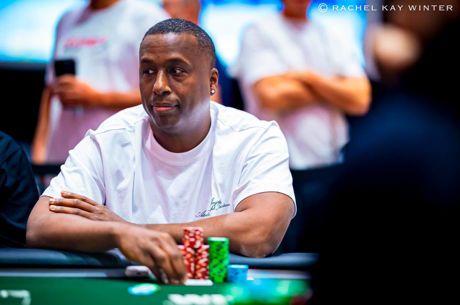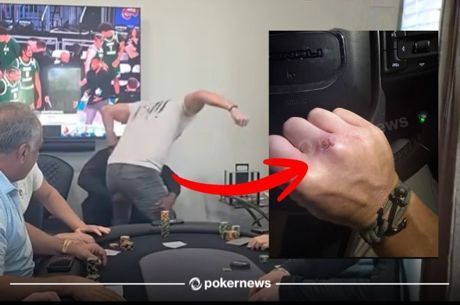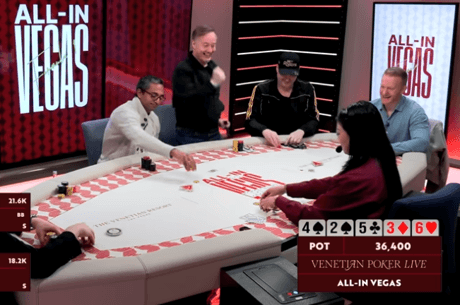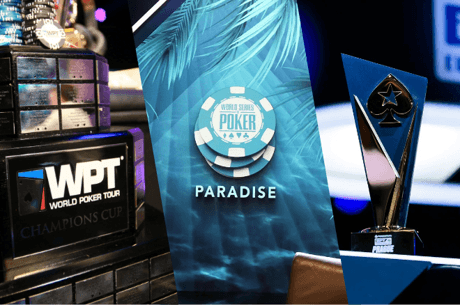Former SuperNova Elite Mike Ziemba on Surviving Black Friday and Grinding Online in NV

Every day 28-year-old professional poker player Mike Ziemba wakes up at whatever hour his eyes happen to open, brews a pot of coffee, and sits down to play poker at the duel-monitor grind station in his Las Vegas home.
After his first session, Ziemba takes a break for breakfast, then returns to his chair to put in more hands. After his second session, he plays tennis or works out — Ziemba has a prop bet with two friends where he has to work out five days a week for 45-minutes a day — then comes back home to shower and play a third and final session for the day.
This has been Ziemba’s routine since April 30, the day Ultimate Poker dealt the historic first (truly) legal hand of online poker played anywhere in the United States. When WSOP.com launched their site a few months later in September, Ziemba found himself with a second outlet and more online tables to play.
All this has been something of a renaissance for Ziemba, who like every other online poker player in the U.S. since April 15, 2011, Black Friday, had been wandering the globe, playing tournaments and cash games in live as opposed to virtual poker rooms, trying to find his way in a new world of limited options.
For Ziemba, the new order established by the U.S. Department of Justice on that infamous April tax day was particularly painful, as he felt he was just on the verge of breaking through into the upper echelons of the poker world.
“My entire life I’ve always tried to stay ahead. Go bigger, better, further. I was on that path [with poker],” says Ziemba, who believes he’s played between seven and eight million hands online in his lifetime, and had been mass multi-tabling up to 24 mid-stakes cash games (from $1/$2 to $3/$6), attempting to achieve SuperNova Elite status on PokerStars for a second consecutive year. He wouldn’t disclose his exact earnings, but he admitted that he was making “doctor hourly wages.” His plans for 2011 included buying a house. He had just sent the largest check of his life to the Internal Revenue Service.
Oddly enough, he learned about the government shutdown when his Mom called him that Friday morning. “It was such a blind side that I didn’t know what to do,” Ziemba says. “I didn’t have a plan. I’d been fired from my dream job and never saw it coming.” All of a sudden, after years of hard work and study, time spent developing his tools, “It wasn’t there anymore. It was just gone.”
Like most professional players, Ziemba’s initial reaction was to seek asylum in a foreign country that would allow him to continue working at his craft. One of the perks of online poker — or any other form of work driven by the power of the Internet — is that friends, colleagues, and cohorts can live thousands of miles apart. Ziemba had formed friendships with a few players in Sweden during his online career, so after Black Friday he flew to Europe to continue grinding.
In Sweden, Ziemba continued to improve. He claims that one of his friends was one of the best mid-stakes players in the world, and that playing side-by-side with him for up to 60 hours at a time made him think about the game differently.
“It seems like the best way to get better at poker,” Ziemba says with a little laugh, “is to befriend opponents who are the best and see what they’re doing.”
While abroad, Ziemba traveled and partied “maybe too much,” but reflecting back he says it was the best time of his life. Which is why it’s so surprising that he returned to America, where he was forced to grind out live poker rather than play thousands upon thousands of hands online.
“One of the biggest mistakes I made was not staying in a foreign country and playing online poker,” Ziemba says. “Online poker is leaps and bounds better than live poker in terms of job security and income.. I could’ve stayed [in Europe] longer, but I don’t know. I don’t really know.”
Staying away from your home country for an extended period may be tough, but for Ziemba adapting to live poker was at least as challenging. It wasn’t just the fact of playing fewer hands at a much slower pace that he found hard. “This sounds hilarious, but you have to get dressed, and make sure you have food,” Ziemba says. “There’s a schedule. When I play online poker, I can wake up whenever I want, I don’t have to call in for a waiting list or anything, and I can literally sit in my underwear if I want to and work.”

Live poker also opened up Ziemba to two new weaknesses — empathy and uncertainty. Unlike online poker, stacking a player in a live ring game meant seeing their reactions. A player’s response to losing all of his or her chips could span from a sarcastic "rebuy" to a dejected tirade, and the latter in particular troubled Ziemba.
“I was unhappy playing live poker because I actually saw the misery,” he says. “I never saw that online [because] I usually blow off the chat box. In the live setting, it would actually make me feel bad, which was a whole different dynamic.”
There was also an absence of statistics or heads-up displays (HUDs) in live poker. Ziemba isn’t a big supporter of HUDs, and believes that online poker might be better and more profitable for him without data-mining, but he also thinks the absence of statistical assurance can drive even the best poker players mad.
“You don’t have programs to see if you’re playing correctly or running bad,” he says. “Live poker can play a lot of tricks on your head. Online you can see exactly how you’re doing, and exactly how you should be doing.”
Though somewhat painful, Ziemba’s experiences in poker rooms across Las Vegas spawned a newfound respect in him for live pros.
“I learned that they really do have a certain skillset,” Ziemba says, with regards to the ability to pick up tells and generate information from human interactions.
Nevertheless, today, with online again legal in his home state, Ziemba is overjoyed because he can once again use his hard-won online tools. Although the player pools are no longer as large as they once were, playing fewer tables forces him to think more. Now, each decision is more calculated. Each click of the mouse is more deliberate.
“Twenty-four [tables] was just absurd,” Ziemba says. “[Now] I have time to make better decisions.” By sitting at fewer tables, Ziemba can actually play more hands and focus better.
Improving remains important to Ziemba, who is always striving to refine his skills and eliminate mistakes. He laughs at the idea that he thought he was “good” as a young player. He specifically recalls depositing his entire $500 paycheck onto PokerStars in high school after several failed $50 deposits. Though he may not have been a great player at the time, he slowly started to master his craft, and counts it as a point of pride that he’s never made another deposit on PokerStars since that day.
Grinding online in the post-Black Friday, Nevada-only market has been profitable for Ziemba, who says that he started over with a “small bankroll” and “turned it into a lot” again. But he worries that he won’t be able to sustain his livelihood unless the player pools grow.
Players who randomly spew off several buy-ins are rare. Even so, “I’ve seen people type into the chat ‘I just lost five grand playing craps, I’m trying to get my money back,’” Ziemba says. “That’s amazing to me.”
Still, the fact remains: “We need more people,” Ziemba says. “If I keep winning, and my other opponents are winning, someone has to be going broke.”
Ziemba’s presence alone is very meaningful to both the Ultimate Poker and WSOP.com. According to PokerScout, the combined seven-day average of the two sites is 205 players, with 120 on WSOP.com and 85 on Ultimate Poker. That number is defined as “seats filled” and not “unique players,” and with Ziemba averaging 10-12 tables at a time, he makes up roughly five percent of the entire player pool in Nevada.
To put that into perspective, in order for a single player to represent five percent of PokerStars’ seven-day average, which is consistently around 22,000 players, someone would have to find a way to mass multi-table 1,100 games at a time.
While the online scene may not be optimal at the moment, Ziemba seems able to make it work. Some online poker players rely heavily on numbers, pushing every statistical edge they can find, but Ziemba strays from the “standard” lines and blends different approaches to keep his opponents off balance. His goal is to never play in such a way that will reveal his actual holdings.
“You can talk about what’s ‘correct’ and what’s ‘not correct’ in a vacuum, but if you can manipulate a person to make mistakes, or to do certain things, that’s what it’s all about,” Ziemba says. “If you can win every hand, why not? The best players fight for pots that others might normally give up on. They make your life hell. There’s enjoyment with making other players’ lives hell.”
Watching him play, it’s apparent that his opponents don’t win pots off of him — they have to earn them. During one session, I noticed that he never clicked the “auto fold” button. Not once. He explained that the dynamics always change, and you never know when you’ll be able to exploit a player’s weakness even without worrying about your own holdings. He later three-bet in position with rags after a raise and a call, and both the raiser and the flatter mucked their cards when the action folded back to them.

Even before poker, Mike Ziemba seemed destined for success. At the tender age of 16, having worked his way up the ladder, he became the manager of his parent’s Subway restaurant. His responsibilities included, but weren’t limited to, making the schedule, ordering all of the food, transferring all of the numbers to headquarters, calling the payroll service, and distributing checks. “I was responsible for everything,” he says. When people called in sick, he would have to go into work “and not go out with my friends.”
Living under his parent’s roof and without any large expenses, Ziemba was able to sock away a substantial amount of money. Upon graduating high school, in lieu of college, he purchased a neighboring Subway franchise with his 24-year-old brother. Being 18, Ziemba understood that high school kids didn’t have a lot of money to spend on lunch or dinner, so he proposed that his store would sell — only to high school students — six-inch combo meals and foot-long sandwiches for five dollars, including tax. Though he refuses to take credit for launching the official five-dollar foot-long campaign — Stuart Frankel, owner of several franchises in Miami, Florida is credited with the idea — there is no question that once the plan went into effect, “Our sales starting going up and we were making more money in volume,” Ziemba says. “I spoke in front of development agents and Coke representatives, showing them statistics of my store’s increases after the promotion. It was quite nerve-racking to speak in front of so many established and successful people at such a young age.”
At the same time, in between shifts, Ziemba was successfully multi-tabling $.50/$1 and $1/$2 online. Soon, his poker profits not only surpassed his own salary, he started making more money than the entire store.
“People didn’t really believe me,” Ziemba chuckles. “The games were really good at the time. There was no doubt in my mind that I could do it for a living because my friends were already so successful at it.” When he sold his share of the store and headed for Vegas, he “remembers people saying, ‘he’ll be back in Michigan in a couple of years, he’s just doing his young, immature, Vegas gambling fling.’”
But Ziemba’s Las Vegas gambling “fling” turned into a six-year romance, and despite the post-Black Friday travails and his European adventure, the friendships he’s developed in the gambling capital of America are what keep him there.

Although Ziemba believes he would be more successful financially today if he had remained with Subway and become a multi-unit owner, poker and the good friendships he’s made in Vegas (If you’re around Ziemba, you’ll notice that his phone goes off nonstop) offer him something that is much more important than money:
“What do you really want out of life?” Ziemba asks and then answers his own question: “I’m choosing absolute freedom with a little less money as opposed to working my butt off and not being able to enjoy family, friends, and the good things in life.”
Ziemba says that he doesn’t know if he wants to be a famous high-stakes pro — although he thinks it would be amusing to get to the point where he’s winning and losing cars everyday without any real financial consequences — at the same time, he’s not looking for the gambling rush associated with the nosebleeds, he just wants to “beat the game.”
As the second anniversary of Black Friday approached, and Ziemba started to worry that online poker would never return, he says that his emergency plan was not to return to the business world, but rather to move back abroad and receive backing even though the idea of backing was disconcerting to him.
“I’d never been backed my whole life, and I always thought it was dumb,” Ziemba admits. “Why would people have to be backed? My logic was always, ‘if they have to be backed, they’re probably not good enough.’ I understand it in live poker, because you need an enormous amount of money to play high stakes, but for online, I never really understood. Why would you give someone who can’t manage money all of your money to manage?”
Ziemba’s fears of online poker’s American extinction were lifted at the end of April with the launch of Ultimate Poker; and he was among the first players to register and deposit.
Sitting with him during one of his sessions is an extremely unique experience. His ability to focus and execute unique plays on several different tables simultaneously is remarkable.
In one particular hand, Ziemba takes a flop in a three-bet pot with KxQx. While his mouse is whizzing around his dual monitors, and his eyes are darting from table to table, the virtual flop on this particular table produces a king and two low cards. His opponent fires out a bet.
“He’s going to spaz out and ship here with something like two jacks,” Ziemba says, raising his opponent and whipping his mouse around the two screens every time the monitors signals it’s his turn to act.
The player goes into the tank, but before his time bar empties, forcing him to use more clock or fold, the player shoves all in. Ziemba quickly pulls his cursor over the “call” button, and pushes down on his mouse with his index finger. Sure enough, the player turns over JxJx, and the turn and river both produce bricks.
A small grin flickers on Ziemba’s face, but it expires quickly. It may be quite a while before the American market returns to its former glory and starts handing out $10,000 packages like they were T-shirts, but Ziemba can’t worry about that at the moment. He has another decision to make on the beeping screen in front of him. And then hundreds more to make after that.
Get all the latest PokerNews updates on your social media outlets. Follow us on Twitter and find us on both Facebook and Google+!









